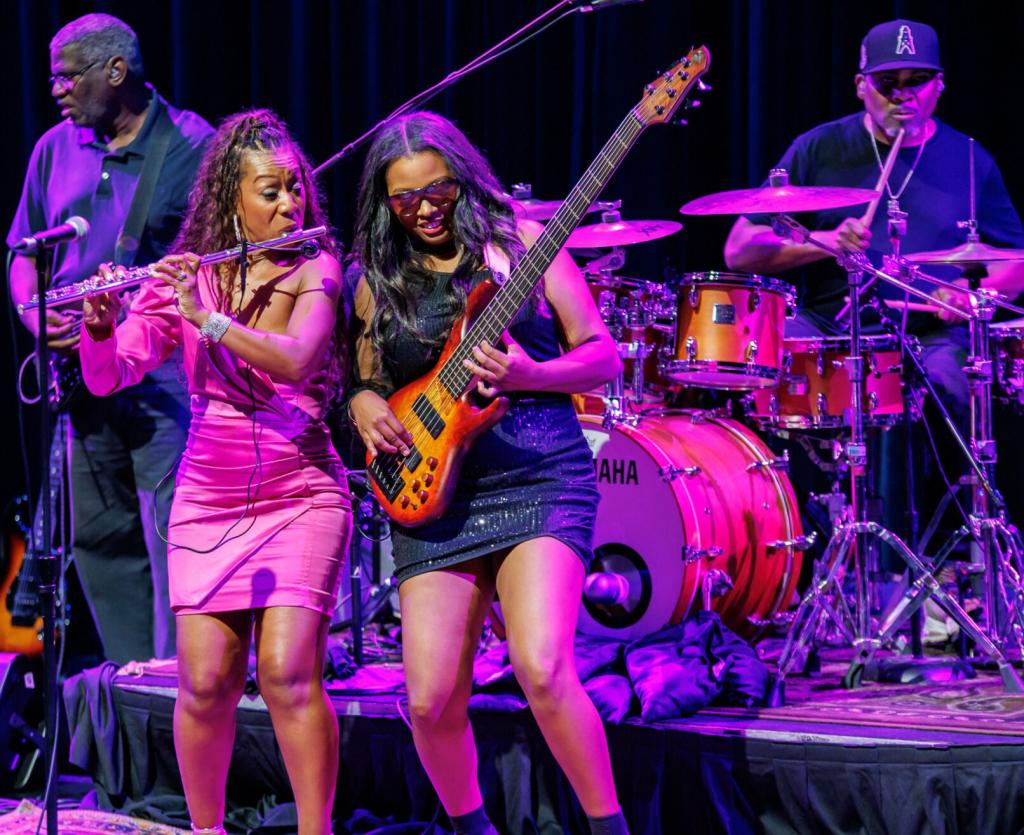Current Application |
Funding Guidelines |
Application Assistance |
How to Apply |
Workshops & Office Hours |
Application Open!
Intake and Eligibility Form due December 4 at 6:59 PM
Application due December 11 at 6:59 PM
APPLY NOW
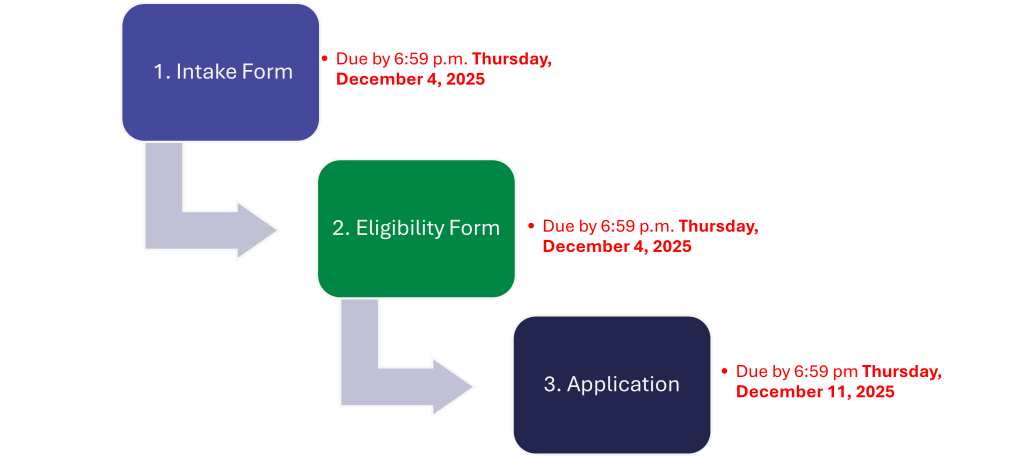
Austin Arts, Culture, Music and Entertainment (AACME) offers grant funding to support Austin's artists, cultural groups, music, and heritage tourism. Whether you’re just getting started or have decades of experience, AACME funding programs support and promote your work.
- Fiscal Year 2026 AACME Funding Guidelines (English, PDF) (Spanish, PDF)
- To learn more about requirements for all funding programs, go to Fiscal Year 2026 AACME Funding Guidelines
- To learn more about specific requirements of a particular program, click on the program link below
- Applicants may now access all steps in the FY26 application process. Apply now!

Encourages, promotes, improves, and showcases Austin’s diverse music industry. |

Creative Space Assistance Program Supports commercial creative spaces facing displacement or new leases at higher and unaffordable rates. |
|
Offers funding for arts organizations, individual artists, and creative businesses that produce culturally vibrant and diverse art. |
Serves to promote tourism through historic preservation projects and activities inclusive of all stories rooted in history and heritage. |

Nexus Supports emerging cultural and creative individuals and organizations to produce public projects and activities for Austin's diverse communities. |
|
Thrive Offers focused investment to sustain and grow local arts nonprofit organizations deeply rooted in and reflective of Austin’s many cultures. |
Current Application
Applicants may now access the FY 26 application for the Austin Live Music Fund, Creative Space Assistance Program, Elevate, and Heritage Preservation Grant. Visit each funding program webpage for individual program details not listed below for all programs.
Fiscal Year 2026 AACME Funding Guidelines (English, PDF) (Spanish, PDF)
Fiscal Year 2026 AACME Funding Guidelines
- Overview
-
In February 2025, the City of Austin established Austin Arts, Culture, Music, and Entertainment (AACME) to better support the City’s ongoing work with Austin’s creative community, making the city a stronger place for arts, culture, and music. AACME goals include:- Meaningful direct support for artists and cultural groups
- Local economy growth and development to attract visitors and build stronger communities
- Enduring partnerships between artists, cultural groups, and businesses
- Open and accessible spaces that connect residents and tourists through arts and culture to strengthen community identity and promote collective storytelling
- Further build Austin’s identity as a global city for creativity The AACME Funding Program Guidelines outline everything you need to know about eligibility, funding priorities, allowable expenses, and application review.
AACME Funding Goals
Austin is home to many creatives that draw tourists and locals alike to the community. A central initiative of AACME is to invest in the creative economy and expand access and participation in arts, music, and heritage by providing grant funding for activities that enrich the public, broaden tourism, and contribute to a vibrant community. AACME supports our community by prioritizing the preservation of creative space, the elevation of arts and arts nonprofits, and through events, projects, and music that contribute to the cultural fabric of Austin.
Our programs support all Austinites with a focus on historically underrepresented communities in funding. Our goals and measures of success align with city wide plans, such as Imagine Austin and the City-Wide Strategic Plan. The current AACME Funding Guidelines are in effect through 2027
State of Texas Funding Requirements
The State of Texas allows cities to use Municipal Hotel Occupancy Tax (HOT) funds to promote tourism and the convention and hotel industry, but only for certain approved purposes. These rules come from Section 351.101 of the Texas Tax Code.
Arts activities that encourage, promote, and share the arts with the public. This includes events, performances, exhibitions, and other major art forms.
Historic preservation projects and programs that invite tourists and convention visitors to explore historic sites and museums. These sites can be near convention centers or visitor centers, or other places in Austin that attract tourists.
- Eligibility “At a Glance”
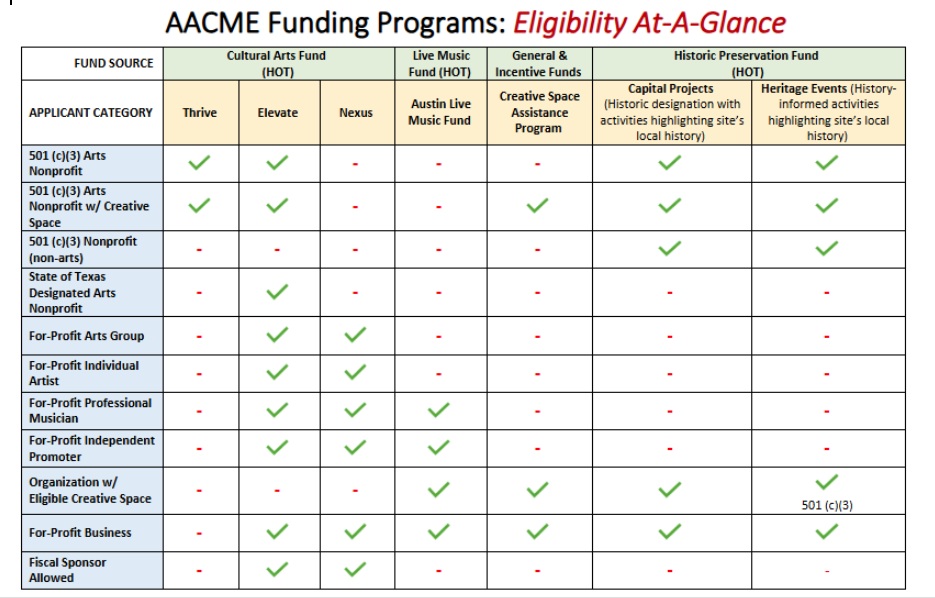
- Expenses
-
Eligible ExpensesSee individual program guidelines for additional details:
- For HOT funded programs, eligible expenses include—but may not be limited—to compensation, marketing & outreach, insurance, supplies, permits, rentals, production, and performance and service fees related to the grant-funded activities promoted to tourists
- For grants over $10,000, potential for up to $2,000 for project-related equipment purchases/repairs, dependent upon the program and with AACME staff approval
Ineligible Expenses
- Awardees are prohibited from “double dipping” (see definition in Appendix A: Definitions) with their grant funds to cover the same expenses or activities. Each Grant Agreement will dictate what expenses are allowed during the grant agreement term
- Awardee travel costs, including gas, flights, hotels, tolls, parking, and ferries
- Curriculum development or programming, scholarly or academic research, and any related activities
- Food & hospitality
- Fundraisers, capital campaigns, and benefits, including entertainment and receptions
- Start-up costs of a new organization, for example, expenses associated with filing for an LLC, or nonprofit status
- Consultants who are also employees
- Payments to students or interns whose employment is tied to class credit
- Purchase of gifts, awards, cash prizes, scholarships, contributions, donations, or re-granting of funds
- Existing debts, fines, contingencies, penalties, interest, taxes, or litigation costs
- Applicant & Awardee Requirements
-
All ProgramsAACME staff work with applicants and awardees to ensure expectations are clear and in line with City of Austin policies, which include the following requirements. Applicants must:
- Be at least 18 years old
- Comply with the City of Austin ‘Conflict-of-Interest’ policies and practices (see Appendix F: Conflict-of-Interest Policy)
- Live or be based in the Austin–Round Rock Metropolitan Statistical Area (MSA) for the duration of the grant agreement
- Maintain City of Austin grant compliance for continued funding eligibility (see definition for “Non-Compliance” in Appendix A: Definitions)
- Awardees may only accept one award from either the Live Music Fund or the Cultural Arts Fund if offered both in the same fiscal year (see definitions for “Live Music Fund” and “Cultural Arts Fund” in Appendix A: Definitions)
- Not be a permanent, full-time City of Austin employee
- Not be a full-time or part-time Austin Arts, Culture, Music and Entertainment Employee
- Maintain required insurance for grant-funded activities
- Ensure grant funded public activities occur in Austin or its ETJ (see definition in Appendix A: Definitions), unless specified differently in individual guidelines
- Produce events and/or activities that are open and advertised to Austin residents, visitors, and tourists
- Decline any portion of awarded funds not needed
- Return any unused funds
Tourism Marketing & Outreach
Awardees must promote their grant funded activities to attract tourists, convention delegates, and local audiences through marketing and promotional plans. They must also commit to the following:
- City of Austin branding logo and official publicity statement placement on all related marketing materials
- Complete two tourism marketing training workshops provided by Third Party Administrators; and
- Promote grant funded events (at no-cost) on VisitAustin.org, at a minimum
- Evaluation Review & Scoring
-
Depending on the program, applications are evaluated and scored through either evidenced multiple choice answers or through peer panel processes. Evaluation review and scoring processes are detailed in the program guidelines.Applications that meet the requirements outlined in each program’s guidelines and receive the highest scores are recommended for funding. However, the number of approved grant awards depends on available funding, and a grant award is not guaranteed.
Applicant Introduction Statement - For some programs, applicants must submit a narrative or video to provide additional context about their proposed project or creative work. This is an opportunity to share additional context to your work that you think may be helpful to the panelists. The Introduction Statement is NOT scored but is reviewed by panelists to better understand the elements that may require interpretation.
- Accessibility Statement
-
AACME programs are open to all people regardless of race, gender, gender identity, ethnicity, language, sexual orientation, physical ability, and socioeconomic status. It is committed to quality customer services and to provide information in a manner that is accessible, relevant, and timely to residents. The department provides meaningful access to City programs and services through translation, interpretation, and other accommodations upon request.For more information about translation and interpretation services, please contact AACME staff at ACME@austintexas.gov or contact 3-1-1.
- Definitions
-
Applicant Introduction Statement: Applicants must submit an introductory statement as either a written narrative or video. The Applicant Introduction Statement is not scored. See applicable programs for details. Applicants may choose one (1) format:- Written Narrative: Up to 3,000 characters (with spaces)
- Video: Up to 3 minutes in length (submitted as a shareable link)
Arts Group:- A group of two or more people who have been collaborating (see collaborator definition) or creating work together for over 1 year
- Or, An individual artist (see definition) with a registered LLC or other incorporation
- Or, An entity that does not have nonprofit status.
* For all Arts Groups, artistic goals or creative mission is the production of arts and culture activities, which includes arts service providers that offer professional support to creatives
Awardee: An individual or organization that has been selected to receive funding through an AACME grant program. Also referred to as a “grantee.” Awardees must meet program requirements and fulfill all contractual obligations, including reporting and promotion.
Capital Expenses (Non-Expendable): Money spent by a business or organization on acquiring or maintaining fixed assets such as equipment, instruments, etc. Any single capital expenditure over $2,000 must be pre-approved by the program staff administrator to ensure compliance with the grant agreement and City policy. Capital expenditures include, but are not limited to, the purchase, repair, or renovation of such equipment and property as speaker systems, theater seats, artwork, etc. These are examples and not an exhaustive list. Please contact your program administrator for further questions about specific expenses.
Capital Improvement Project - Bid Package: A complete set of formal estimates from a contractor, preservation architect, subcontractor, and vendors of a capital improvement project at historic sites. Each bid within the package should include the cost, description, timeframe, contracting roles, treatment method, and scope of work to be performed. Bids must specify materials and explain how the work complies with the Secretary of the Interior’s Standards for the Treatment of Historic Properties.
Capital Improvement Project - Owner Authorization: Applicants must include a signed letter from the historic property owner granting permission for the proposed capital improvement project. Applications without this documentation are not considered for review.
Capital Improvement Project - Phased Work: Phased work divides a large project into smaller focused scopes of work.
City of Austin Council District: The City of Austin has ten single-member districts. To find which district an address is in, visit https://maps.austintexas.gov/GIS/CouncilDistrictMap/ and click “I Want to...” then click “Find my Council District.”
City of Austin Fiscal Year: The City of Austin Fiscal Year (FY) runs from October 1 through September 30 of the following year.
City of Austin Musician Pay Rate: As directed in Resolution No. 20230720-123, the pay rate for musicians for live City music performances is no less than $200 per musician for groups of up to six people; $150 per musician for groups between seven and ten people; and $1500 total for groups of musicians of ten or more.
City of Austin Recognized Cultural District / Corridor: See a list of City of Austin recognized Cultural Districts, as well as a map of City of Austin recognized Cultural Districts.
Collaborator/Collaboration: A contributor that has a share in the direction of the project or proposal. All collaborations must meet the minimum program eligibility, including years of operating history in Austin, meaning that the collaboration must have documented history of producing public activities for the minimum years required per program. For the purposes of the Arts and Culture grants all collaborators fall within the Arts Group (see definition) applicant type.
Commercial: A for-profit business that prioritizes the marketability, profitability, and overall success of a product or service, with a primary focus on marketing, sales, and revenue of a product or service.
Community Benefit: The opportunity for Austin residents, visitors, and tourists to access and actively engage in arts, music, heritage, and cultural activities, including experiences at historic sites, cultural spaces, and through works of public art that align with the goals of our program areas.
Creative Space: An establishment where arts/culture programming is the primary function. The location is publicly accessible and able to be rented by creative producers. The space may present one or more art forms including, but not limited to live music, dance, theater, visual art, film, museums, galleries etc. The operator of the space may be a for profit or a nonprofit entity.
Creative Worker: Individuals employed or contracted in arts, music, heritage, or other cultural fields. This includes artists, musicians, curators, arts administrators, educators, designers, and production staff who contribute to Austin’s creative economy.
Cultural Arts Fund: City of Austin budget fund sourced through Municipal Hotel Occupancy Tax revenues, which is the source of award funds for AACME facilitated Arts & Culture funding programs.
Cultural and Heritage Tourism: The use of the performing and visual arts, festivals, architecture, historic places, and other phenomena that contribute to the cultural vitality of a city to attract tourists to a specific city/geographic region.
Double Dipping: Awardees are prohibited from using funds from multiple AACME grants to cover the same project expenses within a City of Austin fiscal year (October 1 – September 30). Each Grant Agreement dictates what expenses are allowed during the grant agreement term.
Emerging Artist: An individual in the early stage of their creative practice, with less than two years of experience producing or presenting artistic work in a public context. Emerging Artists may be self-taught, professionally trained, or newly entering the field and are still developing their audience, artistic identity, and body of work. For the purposes of AACME Funding, “emerging” artists must also have received no more than one prior AACME grant award.
Experience: Refers to an organization’s, group’s, or individual's history of producing creative work, managing programs or events, or engaging with audiences. Experience can include past projects, performances, exhibitions, workshops, cultural preservation work, or other efforts that demonstrate creative impact and community involvement. Experience may be continuous or may reflect periods of pause, change, or transition.
Extraterritorial Jurisdiction (ETJ): The unincorporated land that is contiguous to the corporate boundaries of Austin and is located within five miles of those boundaries. Austin’s ETJ currently extends into 4 counties including Travis, Williamson, Hays, and Bastrop. To learn where the address is located, go to https://www.austintexas.gov/GIS/JurisdictionsWebMap/ and click “I Want to...” then click “Find my Jurisdiction”.
Fiscal Sponsor: A Fiscal Sponsor is a nonprofit organization with a 501(c) tax-exempt status that applies for financial support on behalf of another organization or individual, allowing the sponsored project to benefit from the sponsor’s tax-exempt status. A Fiscal Sponsor manages financial transactions and reporting responsibilities for the Sponsored Project. Please note that all Fiscal Sponsors must be headquartered in Austin and are responsible for ensuring that all funding is used for tax-exempt, charitable purposes as defined by the Internal Revenue Code. Additional information on Fiscal Sponsorship is available on the AACME website.
Heritage Tourism: People who travel to experience the places, artifacts, and activities that authentically represent the stories and people of the past and present (Definition from the National Trust for Historic Preservation).
High-Quality Programming: Programming that is thoughtfully created and deeply engaging emotionally, culturally, or intellectually for its intended audience. It reflects a well-defined artistic process, demonstrates clear intent, and shows a strong understanding of artistic influences and context.
Historic Preservation Fund: City of Austin budget fund sourced through Municipal Hotel Occupancy Tax revenues, which is the source of award funds for AACME facilitated Heritage Tourism funding programs.
Independent Promoter: Must meet all the following requirements:- No more than 3 employees
- And, at least 2 years documentation showing that applicant has curated and promoted live shows featuring musicians and bands
- And, must not be contractually tied to one venue
Individual Artist: Person who creates, produces, or practices artistic disciplines as their primary form of creative expression. This includes, but is not limited to, visual artists, performing artists, writers, filmmakers, designers, and musicians. This includes individuals who operate their arts business as a sole proprietor.
Lead Applicant: The individual who submits the grant application and serves as the primary point of contact with AACME and its third-party administrators (e.g. Authorized Official / Executive Staff / Official Board of Trustees Executive Committee / Founder). The “Lead Applicant” is the authorized signatory on the grant agreement and has legal authority to represent the applying organization or group. This individual is accountable for the accuracy of application materials, adherence to grant requirements, and compliance with all contractual obligations if funding is awarded.- Nonprofit organizations, the “Lead Applicant” must be an authorized executive staff member, program director, or official listed on the organization’s governance documents and have authority to sign grant agreements on the organization’s behalf.
- Arts Groups, Individual Artists and Professional Musicians, the “Lead Applicant” must be a core project leader with documented authority to act on behalf of a project to fulfill grant obligations, including signing the agreement.
- Sponsored Projects, the “Lead Applicant” must be a core project leader with documented authority to act on behalf of a project and coordinate with the Fiscal Sponsor to fulfill grant obligations, including signing the agreement.
- For-profit entities, the “Lead Applicant” must be the individual granted legal signature authority to sign agreements on behalf of a company or sole proprietorship.
Live Music Fund: City of Austin budget fund established by City of Austin Ordinance No. 20190919-149, which is sourced through Municipal Hotel Occupancy Tax revenues and is the source of grant funds for AACME’s Austin Live Music Fund.
Live Music Venue: An establishment where live music programming is the principal function of the business and/or the business is a live music destination, and where the venue establishes the ability of an artist to receive payment for work by percentage of sales, guarantee, or other mutually beneficial formal agreement for every performance. A live music venue is a destination for live music consumers, and/or its music programming is the primary driver of its business as indicated by the presence of at least five (5) of the following:- Defined performance and audience space
- Mixing desk, PA system, and lighting rig
- Backline
- At least two of the following: (i) Sound engineer (ii) Booker (iii) Promoter (iv) Stage manager (v) Security personnel
- Charges admission to some music performances through ticketing or front door entrance fees
- Markets talent through show listings in printed and electronic publications
- Hours of operation coincide with performances
- Programs live music at least five nights a week
Municipal Hotel Occupancy Taxes (HOT): As outlined in State of Texas Statute Chapter 351, municipalities are authorized to charge a tax of up to 7% on individuals staying overnight in hotels or other accommodations, which creates revenue that must be used for one of nine allowable uses, including the promotion of the arts and to “promote tourism and the convention and hotel industry.”
Multi-Use Creative Space: A Commercial Creative Space that provides a publicly accessible area or areas that can be used for a wide variety of creative events, including arts exhibitions, concerts, plays, film screenings, etc.
Museum / Art Gallery: Facility with a principal function and mission to exhibit, present, and/or sell artistic work in a variety of media produced by an artist, artist collective, or arts and culture organization, accessible by public audiences. City-run/owned, State-run/owned, or Federally-run/owned facilities are not eligible.
Non-Compliant Status: An Applicant who has failed to comply with or complete all requirements and has not responded to the three-step non-compliance plan and has not completed all requirements of their AACME grant. Non-compliant status prevents past awardees from being eligible for new grant funds for five years. Non-compliant status can be resolved by submitting the required final report materials and receiving confirmation from a grant administrator that the contract requirements have been completed and the agreement is closed.
Nonprofit Organization with a 501(c)3 Status: A federally designated organization with tax-exempt status under Section 170(c) of the Internal Revenue Code of 1954 (as amended), that ensures no part of its net earnings benefits any private individual. The organization must have a primary mission that supports the arts. If 501(c)3 status is pending, confirmation must be provided by the application deadline.
Nonprofit Arts Organization: A State-designated 501(c) registered with the Texas Secretary of State as a nonprofit corporation (incorporated or unincorporated) with a Certificate of Formation approved by the application deadline, and whose primary mission supports the arts.
Occupant Load Card: The occupant load is the number of occupants for which the means of egress of a building or part of a building is designed. Scroll down the Commercial Plan Review webpage for details.
Operating Budget: The annual total of an organization’s planned expenses for delivering its programs, services, and operations. Used to calculate eligibility and award amounts in several AACME funding programs. IRS 990s or equivalent records or relevant financial statements such as Profit and Loss Statements, Annual Budgets, CPA-Prepared Financial Statements.
Performance Venue / Theater: An establishment whose principal function and mission is to present live performances, plays, live music, film screenings, or other performances of artistic work produced by an artist, or arts and culture organization, accessible by public audiences.
Preservation: Emphasizes using buildings and places as essential carriers of community history that embody the character and traditions of a place, acknowledging historic structures and landscapes as irreplaceable stories of our cultural and architectural heritage.
Professional Musician: Must meet at least one of the following requirements:- At least 2 years of documentation showing that applicant has regularly performed as a professional musician—solo or as part of a band—in live performances to public audiences
- Or, 6 released recordings (singles)
- Or, 6 promotionally released music videos
Publicly Accessible: An activity, event, or space that is open to the public, either free or with an admission fee, and advertised in a way that allows residents, tourists, and the public to attend or participate.
Rehabilitation: The process of making continued use of a property possible through repair, alterations, and additions while preserving features which convey its historical, cultural, or architectural values.
Restoration: The process of accurately depicting the form, features, and character of a property as it appeared at a particular time period by means of the removal of features from other periods in its history and reconstruction of missing features from the restoration period.
Sponsored Project: The individual or group that is under the umbrella of a Fiscal Sponsor, which is a 501(c) organization.
The Secretary of the Interior’s Standards for the Treatment of Historic Properties: Guidelines for preserving, rehabilitating, restoring, and reconstructing historic buildings. For more information, visit The Secretary of the Interior's Standards for the Treatment of Historic Properties guidelines.
Tourist: An individual who travels from the individual’s residence to a different municipality, country, state, or country for pleasure, recreation, education, or culture (Texas State Tax Code Chapter 352, p. 1).
Unearned Income: Revenue that is donated, such as grants and donor contributions.
Visitor: An individual traveler that stays overnight away from home in paid or unpaid accommodations, or a day visitor that travels at least fifty miles one-way from home on a non-routine trip.
Application Assistance
(Above) AACME Funding Program Application Workshop Recording in English
Download Workshop Slides (English, PDF)
(Above) AACME Funding Program Application Workshop Recording in Spanish
Download Workshop Slides (Spanish, PDF)
- How to Apply
-
Assistance is available for each step of the following process:
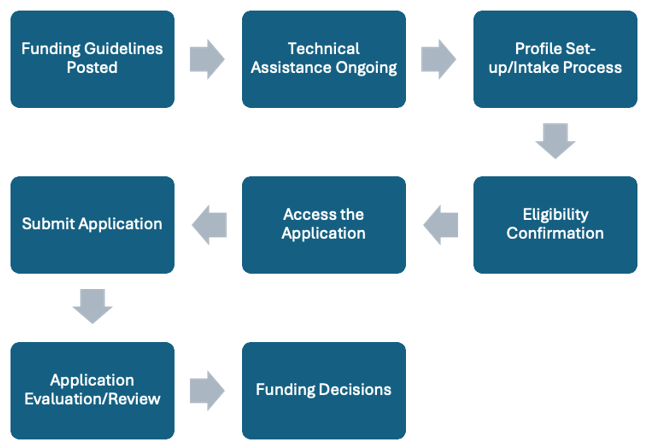
Step 1 - Intake FormApplicant completes the Intake Form to create or update their applicant profile in the Submittable online application system starting on Tuesday, October 14, 2025, at 10am CST. Apply now!
Step 2 - Eligibility Verification Form
After the applicant submits an Intake Form, an Eligibility Verification Form will be automatically assigned for completion to confirm the application for which they are eligible. Eligibility will then be reviewed and verified based on each program’s funding guidelines within four (4) days. The Eligibility Verification Form must be submitted by the posted deadline. Late forms are not accepted.
Step 3 - Application FormVerified eligible applicants will receive an invitation link to complete an application for the funding program for which they are eligible starting on Tuesday, October 21, 2025, at 10am CST. The Application must be submitted by the posted deadline. Late submissions are not accepted.
Step 4 - Evaluation Review & ScoringApplications are reviewed and scored by trained panels or reviewers according to the funding program's specific guidelines.
Step 5 - Funding DecisionsAACME makes final funding recommendations, which are reviewed and approved by City of Austin leadership.
- Application Workshops & Office Hours
-
From your first question about applying to your final report if awarded, AACME Staff and our partners are here to support you every step of the way. Join us and Create Austin at The Long Center staff for the following virtual and in-person events:
Virtual and In-Person Office Hours
Join AACME staff for Virtual Open Office Hours every Tuesday through December 9th from 10:00 A.M. to Noon. No appointment necessary:- Tuesdays, October 7th, 14th, 21st, and 28th (Office Hours Link)
- Tuesdays, November 4th, 18th, 25th (Office Hours Link)
- Tuesday, December 2nd (Office Hours Link)
Join AACME staff for Virtual and In-Person All-Day Open Office Hours from 10:00 A.M.to 4:00 P.M. on the dates below online or in-person at the City of Austin AACME Funding Office; 5202 East Ben White Boulevard, Ste 400, Austin, TX 78741. No appointment necessary:- Thursday, 10:00 A.M. to 4:00 P.M., December 4th (Office Hours Zoom Meeting Link)
- Tuesday, 10:00 A.M. to 4:00 P.M., December 9th (Office Hours Zoom Zoom Link)
- Thursday, 10:00 A.M. to 4:00 P.M., December 11th (Office Hours Zoom Meeting Link)
One-On-One Meetings
Schedule a One-on-One meetings with AACME staff via this Booking Link.
Contact Us
Contact us anytime through ApplicationHelp@thelongcenter.org or call (512) 457-5161, Monday–Friday, from 9:00 A.M. to 11:00 A.M.* for help with all elements of the application process, including program guidelines.For application portal technical support, including creating or logging into your Submittable application account and other online technical issues, refer to the Submittable Applicant and Technical Support Guide or contact Create Austin at The Long Center at ApplicationHelp@thelongcenter.org.*
*Assistance Available in Spanish
AACME Funding Programs Workshops
Download Workshop Slides (English, PDF) (Spanish, PDF)
Virtual AACME Funding Programs Workshops
Meeting recordings (English, Spanish)
- Tuesday, October 21st, from 6:00 P.M. to 7:30 P.M.
- Sign up now to attend the October 21st virtual workshop!
- Wednesday, November 5th, from 6:00 P.M. to 7:30 P.M.
- Sign up now to attend the November 5th virtual workshop!
- Heritage Preservation Grant Workshop:
- Thursday, November 13th, from 6:00 P.M. to 7:00 P.M.
- Sign up now to attend the November 13th Heritage Preservation Grant virtual workshop!
- Monday, November 17th, from 11:00 A.M. to 12:30 P.M.
- Sign up now to attend the November 17th virtual workshop!
In-Person AACME Funding Programs Workshops
- Wednesday, October 22nd, from 11:00 A.M. to 12:30 P.M., Pleasant Hill Branch, Austin Public Library; 211 E William Cannon Dr, Austin, TX 78745
- Sign up now to attend the October 22nd in-person workshop!
- Thursday, October 23rd, from 6:00 P.M. to 7:30 P.M., City of Austin AACME Funding Office; 5202 East Ben White Boulevard, Ste 400, Austin, TX 78741
- Sign up now to attend the October 23rd in-person workshop!
- Heritage Preservation Grant Workshop:
- Monday, November 3rd, from 10:30 A.M. to 11:30 A.M., Southeast Branch, Austin Public Library; 5803 Nuckols Crossing Road Austin, TX 78744
- Sign up now to attend the November 3rd Heritage Preservation Grant in-person workshop!
- Saturday, November 15th, from 12:00 P.M. to 2:00 P.M., Asian American Resource Center 8401 Cameron Road Austin, TX 78754
- Sign up now to attend the November 15th in-person workshop!
- Tuesday, November 18th, from 5:00 P.M. to 7:00 P.M., Ruiz Branch, Austin Public Library 1600 Grove Boulevard Austin, TX 78741
- (presented in Spanish)
- Sign up now to attend the November 18th in-person workshop!
- Thursday, November 20th, from 5:00 P.M. to 7:00 P.M.,Carver Branch, Austin Public Library 1161 Angelina Street Austin, TX 78702
- (with ASL interpretation)
- Sign up now to attend the November 20th in-person workshop!
- Application Resources
-
Language AccessAACME is committed to serving all community members. If you are looking to have a document translated or to request an interpreted one-on-one meeting with a staff member, please contact ACME@austintexas.gov or contact 3-1-1.
Boards & Commissions
Become an AACME Reviewer
AACME invites community members and arts professionals to apply for the "Reviewer" role to conduct "Evaluation Review and Scoring" processes for launched funding programs. Reviewers read, score, and determine awarded applicants according to AACME program guidelines. Please note:
- Submitting a Reviewer application does not guarantee participation
- Compensation – Selected Reviewers receive an honorarium of up to $500 upon completion of required deliverables
Ineligible applicants include:
- Full-time and permanent City of Austin employees
- Individuals under 18 years of age
Apply to be a Reviewer
- Timeline & Time Commitment
-
24 hours total:
- Application Now Open [https://thelongcenter.submittable.com/submit]
- Reviewer selection, scheduling, and assignments: As early as mid-December 2025
- Application Review is 15 hours over 4 weeks:
- Elevate Application Review: Mid-December 2025 - January 2026
- Heritage Preservation Grant Application Review: Late December 2025 - mid-February 2026
- Panel meeting, 8 hours, (8 hours; 9:00 A.M.–5:00 P.M., with a lunch break)
- Elevate Panels begin in mid-January 2026, and conclude by end of January 2026.
- Heritage Preservation Grant Panels begin in early February 2026, and conclude by mid-February 2026.
- What Reviewers Do
-
AACME recruits independent Reviewers to keep the process community-centered, transparent, and grounded in subject-matter expertise. Reviewers provide informed, objective, and constructive assessments that reflect Austin’s diverse cultural ecosystem.
- Reviewer Responsibilities
-
- Training (1 hour): Program Guidelines, Expectations & Scoring Rubric; technical training in Submittable.
- Application Review (15 hours): Independently read and pre-score assigned applications; enter tentative scores and brief comments in Submittable during the 4-week review window.
- Panel Discussion (8 hours): Participate in a facilitated meeting to finalize scores and funding recommendations.
- Reviewer Selection
-
Reviewers are selected through an open nomination process. Recruitment includes:
- Department newsletters and social media
- Community partnerships and Commission referrals
- Arts: Local cultural organizations, creative and heritage networks, and discipline-specific listservs
- Preservation: Local or national preservation organizations, networks, and discipline-specific listservs
- Publicly accessible Reviewer application form on the City’s website
AACME staff screens applicants and recommend reviewers based on the following:
- Subject matter expertise relative to the applicant pool
- Arts: Community knowledge and geographic representation
- Ability to meet time and training commitments
- Absence of Conflicts-of-Interest
Panel Composition Goals – Each panel includes:
- A minimum of four reviewers, ideally 5–7
- A mix of local and regional reviewers
- Subject matter experts and community members
- Arts: Representation specific to creative discipline being evaluated
- Preservation: Representation specific to historic preservation and heritage tourism
- Experience in nonprofit and community-based practice
Reviewer names and brief bios will be available to applicants and to the public. Video recording of panel and anonymized written Reviewer comments are shared with applicants after awards are announced.
- Reviewer Conflict-of-Interest Policy
-
To maintain public trust and uphold the integrity of AACME Funding, all individuals involved in the grant process, including applicants, panelists, reviewers, commissioners, and staff must avoid both actual and perceived conflicts-of-interest.
Reviewers must:
- Participate in a virtual facilitated training discussion
- Complete training before receiving application assignments
- Be prepared, objective, and fair
- Provide scoring and comments aligned with rubric criteria
- Maintain confidentiality and professionalism
- Disclose any potential conflicts that may arise and complete a Conflict-of-Interest form, prior to scoring each application
Panelists who fail to disclose a conflict may be dismissed and disqualified from future review opportunities.
- Who Should Apply
-
Reviewers should:
- Demonstrate knowledge or expertise in at least one artistic, cultural, or preservation discipline
- Reflect different backgrounds, demographics, geographies, and community ties
- Include both arts professionals, tourism professionals, and engaged community members
- Have experience with or interest in civic-focused evaluation to expand access and opportunities
Reviewers may be:
- Arts: Practicing artists, administrators, educators, producers, curators, or cultural organizers
- Preservation: Practicing architects, museum educators, preservationists, tourism professionals
- Nonprofit professionals, arts funders, or community leaders
- First-time or returning reviewers
Questions?
Virtual Open Office Hours: second and fourth Tuesdays, 10:00 A.M.–12:00 P.M.
Email: culturalarts@austintexas.gov
Call: 512-974-7700
Apply to be a Reviewer
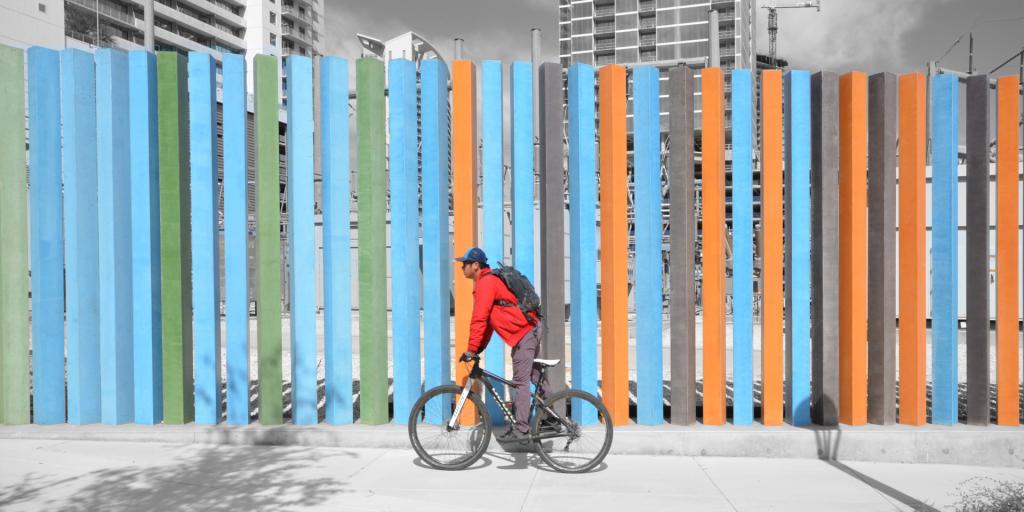
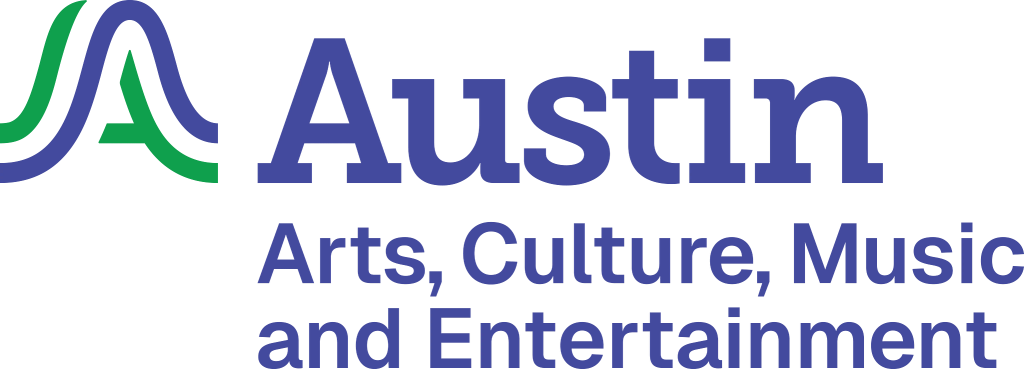

 Elevate
Elevate